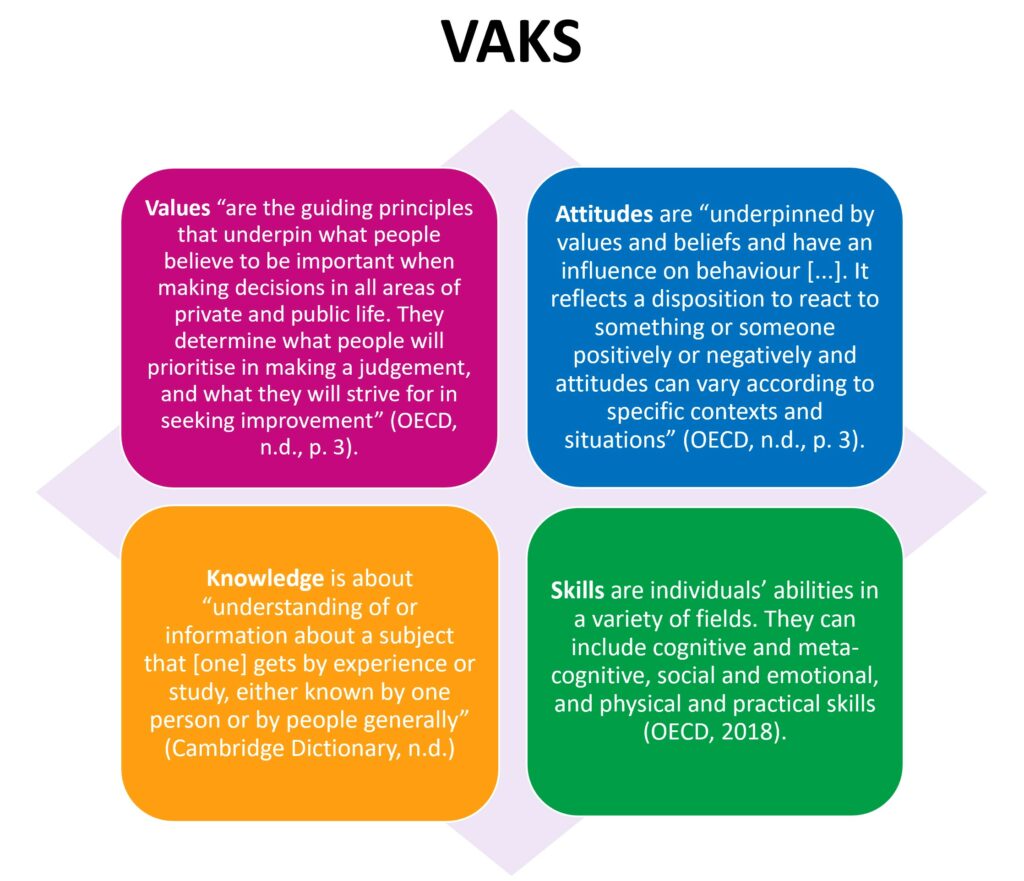Values, attitudes, knowledge, and skills (VAKS) for teacher competences for multilingual pedagogies and global citizenship education
A teacher who is committed to Global Citizenship Education (GCE) and multilingual pedagogies tends to hold a range of values, attitudes, knowledge, and skills in these areas. In this framework, we present some of the core competences that such a teacher is likely to hold. We do not expect the framework to be completely comprehensive but we hope that it is a useful reflective tool for those wishing to teach GCE and multilingual pedagogies.

PDF version
This tool is available as PDF in the following languages:
Static version
Values
Attitudes
Knowledge
Skills
As a teacher, I…
- …identify as a global citizen.
- …value linguistic and cultural diversity.
- …feel a sense of responsibility for taking action on global issues.
- …am committed to environmental sustainability.
- …am committed to social equity.
- …believe that pedagogy should be built on values of empathy and compassion.
- …respect my learners’ identities, voice, and right to their own opinions.
- …value my learners’ participation in classroom decisions and processes.
- …believe in the importance of teaching my learners critical attitudes and behaviours.
- …believe that my learners should be supported in developing a sense of responsibility and agency for addressing global issues.
As a teacher, I…
- …am open towards developing new skills in respect to global citizenship education and multilingual pedagogies.
- …want to promote tolerance, open-mindedness, and curiosity in my learners.
- …feel that it is important to reflect on myself and my practices.
- …believe that all teaching should promote respect for all types of diversity.
- …am willing to engage with sensitive and controversial topics in my classroom.
- …like to challenge my learners to adopt a global view in their thinking.
- …am sensitive to my learners’ linguistic and cultural backgrounds.
- …want to actively work with my learners’ linguistic resources.
- …want to stimulate my learners to think critically about global issues.
- …am committed to teaching my learners how to be responsible global citizens.
As a teacher, I…
- …have an understanding of the diversity of cultures.
- …know about some of the challenges people face in different parts of the world, in terms of social equity and access to resources.
- …understand some of the root causes of global poverty and inequalities (e.g., European colonialism).
- …am familiar with the Universal Declaration of Human Rights.
- …understand some of the issues underlying global migration.
- …am aware that some of my consumption habits have an effect on people and the environment in other parts of the world.
- …understand that language is important to one’s identity and especially to the identities of my students.
- …am aware of the languages my students use and speak.
- …know strategies to encourage my students to draw on their multiple languages in the classroom for social and for learning purposes.
- …am aware that languages and the use of language is related to issues of power and status.
As a teacher, I am able to…
- …promote students’ critical and independent thinking.
- …help students become aware of representation in media, in particular the voices and positioning of certain social groups.
- …show students how to examine the origins and implications of their own assumptions.
- …challenge students to engage with complex local/global processes (e.g., socioeconomic inequalities).
- …foster students’ awareness that their choices or lack of action affect their own lives and those of others.
- …show students how to appreciate and learn from all kinds of diversity.
- …guide students to analyse causes and consequences of conflict from different perspectives.
- …promote multilingualism, including regional, minority, and migration languages.
- …make students aware of issues of power and status in languages and language use.
- …teach students how to use their different languages as resources.
